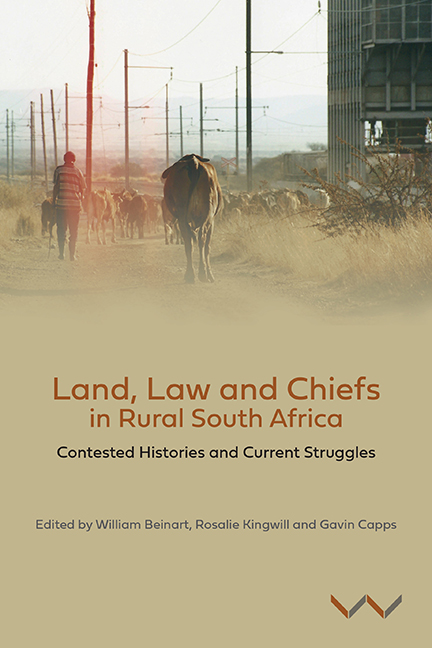Book contents
- Frontmatter
- Contents
- Maps
- Acronyms and Abbreviations
- Preface
- Introduction Land, Law and Chiefs: Contested Histories and Current Struggles
- Chapter 1 Constitutional Court Judgments, Customary Law and Democratisation in South Africa
- Chapter 2 Was ‘Living Customary Law’ There All Along?
- Chapter 3 When Custom Divides ‘Community’: Legal Battles over Platinum in North West Province
- Chapter 4 Chiefs, Mines and the State in the Platinum Belt: The Bapo-ba-Mogale Traditional Community and Lonmin
- Chapter 5 Mining, Graves and Dispossession in Mpumalanga
- Chapter 6 The Abuse of Interdicts by Traditional Leaders in South Africa
- Chapter 7 Resisting the Imposition of Ubukhosi: Contested Authority-Making in the Former Ciskei
- Chapter 8 Black Landlords, Their Tenants and the Native Administration Act of 1927
- Chapter 9 Customary Law and Landownership in the Eastern Cape
- Chapter 10 A History of Communal Property Associations in South Africa
- Chapter 11 ‘This is Business Land’: The Hlolweni Land Claim, 1983–2016
- Chapter 12 Restitution and Land Rights in the Eastern Cape: The Hlolweni, Mgungundlovu and Xolobeni Cases
- Contributors
- Index
Chapter 1 - Constitutional Court Judgments, Customary Law and Democratisation in South Africa
Published online by Cambridge University Press: 15 June 2021
- Frontmatter
- Contents
- Maps
- Acronyms and Abbreviations
- Preface
- Introduction Land, Law and Chiefs: Contested Histories and Current Struggles
- Chapter 1 Constitutional Court Judgments, Customary Law and Democratisation in South Africa
- Chapter 2 Was ‘Living Customary Law’ There All Along?
- Chapter 3 When Custom Divides ‘Community’: Legal Battles over Platinum in North West Province
- Chapter 4 Chiefs, Mines and the State in the Platinum Belt: The Bapo-ba-Mogale Traditional Community and Lonmin
- Chapter 5 Mining, Graves and Dispossession in Mpumalanga
- Chapter 6 The Abuse of Interdicts by Traditional Leaders in South Africa
- Chapter 7 Resisting the Imposition of Ubukhosi: Contested Authority-Making in the Former Ciskei
- Chapter 8 Black Landlords, Their Tenants and the Native Administration Act of 1927
- Chapter 9 Customary Law and Landownership in the Eastern Cape
- Chapter 10 A History of Communal Property Associations in South Africa
- Chapter 11 ‘This is Business Land’: The Hlolweni Land Claim, 1983–2016
- Chapter 12 Restitution and Land Rights in the Eastern Cape: The Hlolweni, Mgungundlovu and Xolobeni Cases
- Contributors
- Index
Summary
In the Hyundai case (2000), Chief Justice Langa said that the Constitution is located in the historical transition from a society based on injustice and exclusion from the democratic process, to one that respects the dignity of all citizens and includes all in the process of government. The concept of transition captures two elements of the legal change brought about by the interim Constitution, which came into operation in 1994, and the ‘final’ Constitution of 1996. On the one hand, this was not a process of revolutionary change: the interim Constitution was adopted by the apartheid parliament, and there was legal continuity. The courts continued to exist, the judges stayed in office and existing laws remained in place. But on the other hand, a fundamental transformation was intended: the constitutional transformation aimed to change the nature and purpose of the legal system, so that it would achieve fundamentally different ends from those it pursued under apartheid.
The Constitutional Court was a new apex court, very differently constituted from the existing courts. It was to be the fulcrum of this change in direction. From the outset, the Court repeatedly emphasised the transformational nature of the new Constitution. In the first case the Court heard, Makwanyane (1995), Justice Mahomed emphasised that the Constitution was a decisive break from, and a ringing rejection of, that part of the past that was racist, authoritarian, insular and repressive, and a vigorous commitment to a democratic, universalistic, caring and aspirationally egalitarian ethos.
This dual task – retaining part of the past, but rejecting ‘decisively’ that which was unacceptable – has given rise to a tension between continuity and rupture. The difficulty of this project is aggravated by the fact that law and legal systems tend to be conservative. When you ask a lawyer, ‘What is the law today?’, the lawyer first tries to find out what it was yesterday – not what it should be tomorrow. Precedent is fundamental in common law legal systems such as ours. It plays an important role in promoting predictability and stability. And so we look to precedent – the past – to find out what the law is today. While we now seldom look to the very distant precedents of Roman and Roman-Dutch law, we still look to precedents developed by the courts, mainly over the last century.
- Type
- Chapter
- Information
- Land, Law and Chiefs in Rural South AfricaContested histories and current struggles, pp. 21 - 34Publisher: Wits University PressPrint publication year: 2021



